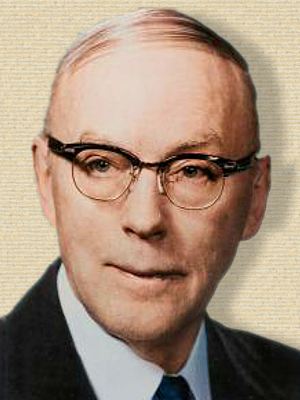 (source)
(source)
|
George A. Lundberg
(3 Oct 1895 - 14 Apr 1966)
American sociologist who throughout his career advocated that sociologists should become scientific and to persuade the educated public that a scientific sociology is possible. He wrote Can Science Save Us (1947).
|
Science Quotes by George A. Lundberg (6 quotes)
A reasonable content for general education today, then, seems to me to be as follows: First, a command of the principal linguistic tools essential to the pursuit of either science or art. Second, a familiarity with the scientific method and with its principal applications to both physical and social problems. And third, appreciation and practice of the arts, including literature. Furthermore, these three fields should be so integrated toward a common purpose that the question of their relative importance would not even arise. One does not ask which is the most important leg of a tripod.
— George A. Lundberg
In 'Education in a Scientific Age', Can Science Save Us? (1947, 2nd ed. 1961), 74-75.
If the scientific method, and especially its application to human relations, is as important as we have contended, then our educational efforts must be judged largely by the degree to which they inculcate a familiarity with this method, and the reliable generalizations it has yielded thus far.
— George A. Lundberg
In 'Education in a Scientific Age', Can Science Save Us? (1947, 2nd ed. 1961), 66-67.
Nearly everybody agrees that, whatever other troubles the advancement of science may have brought in its wake, it has released us from some age-long fears and insecurities. The natural sciences have undoubtedly given us a large measure of control over many of our traditional [natural] enemies.
— George A. Lundberg
In Ch. 1, 'Prescientific Thoughtways in a Technological Age', Can Science Save Us? (1947, 2nd ed. 1961), 1-2.
The time is perhaps at hand when it will be recognized that for intelligent living in modern society it is as necessary to be able to think in averages, percentages, and deviations as it is to be able to read and write.
— George A. Lundberg
In 'Statistics in Modern Social Thought', collected in H. E. Barnes, et al. (eds.) Contemporary Social Theory (1940), 140.
The word science … is a prestige word of great potency. It is therefore attached to all manner of social programs, in order that they may shine by the reflected glory of the neon light and the radio tube. Indeed, a great many accredited social scientists, in the sense of practicing economists, sociologists, psychologists, anthropologists, and above all “political” scientists.
— George A. Lundberg
In Ch. 1, 'Prescientific Thoughtways in a Technological Age', Can Science Save Us? (1947, 2nd ed. 1961), 4.
We sign treaties with all nations agreeing to give up war as an instrument of national policy, and then relax as if war had been made unlikely. The premises and the reasoning are very much like those underlying magical rain-making. That is, we want it to rain, therefore it should rain, therefore it will rain. We have discovered the invalidity of this reasoning in the case of rain, and our schools for the most part no longer teach magical methods of influencing physical events.
— George A. Lundberg
In 'Education in a Scientific Age', Can Science Save Us? (1947, 2nd ed. 1961), 68.
See also:
- Can Science Save Us?, by George A. Lundberg. - book suggestion.

 In science it often happens that scientists say, 'You know that's a really good argument; my position is mistaken,' and then they would actually change their minds and you never hear that old view from them again. They really do it. It doesn't happen as often as it should, because scientists are human and change is sometimes painful. But it happens every day. I cannot recall the last time something like that happened in politics or religion.
(1987) --
In science it often happens that scientists say, 'You know that's a really good argument; my position is mistaken,' and then they would actually change their minds and you never hear that old view from them again. They really do it. It doesn't happen as often as it should, because scientists are human and change is sometimes painful. But it happens every day. I cannot recall the last time something like that happened in politics or religion.
(1987) -- 


